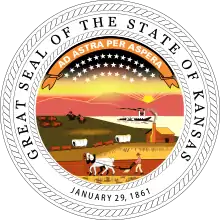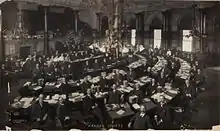Kansas Senate
The Kansas Senate is the upper house of the Kansas Legislature, the state legislature of the U.S. State of Kansas. It is composed of 40 senators representing an equal number of districts, each with a population of at least 60,000 inhabitants. Members of the Senate are elected to a four-year term. There is no limit to the number of terms that a senator may serve. The Kansas Senate meets at the Kansas State Capitol in Topeka.
Kansas Senate | |
|---|---|
| Kansas Legislature | |
 | |
| Type | |
| Type | |
Term limits | None |
| History | |
New session started | January 11, 2021 |
| Leadership | |
Vice President of the Senate | |
Majority Leader | |
Minority Leader | |
| Structure | |
| Seats | 40 |
 | |
Political groups | Majority
Minority |
Length of term | 4 years |
| Authority | Article 2, Kansas Constitution |
| Salary | $88.66/day + per diem |
| Elections | |
Last election | November 8, 2016 (40 seats) |
Next election | November 3, 2020 (40 seats) |
| Redistricting | Kansas Reapportionment Commission |
| Meeting place | |
| State Senate Chamber Kansas State Capitol Topeka, Kansas | |
| Website | |
| Official website | |
Like other upper houses of state and territorial legislatures and the federal U.S. Senate, the Senate is reserved with special functions such as confirming or rejecting gubernatorial appointments to executive departments, the state cabinet, commissions and boards.
History
The Kansas Senate was created by the Kansas Constitution when Kansas became the 34th state of United States on January 29, 1861. Six days after its admission into the Union, the Confederate States of America formed between seven Southern states that had seceded from the United States in the previous months, leading to the American Civil War.
War bonds became a central political issue in Kansas shortly when the Kansas Senate held impeachment trials in 1862, brought about in part by United States Republican Party infighting.[1] The Kansas Senate voted narrowly to convict Kansas Secretary of State J. W. Robinson, and State Auditor George S. Hillyer over what they believed to be the unlawful sale of state bonds.[1] With little evidence of a conspiracy and the smaller role of Governor Charles L. Robinson, his impeachment trial ended with only three state senators voting to convict him.[1]
The state legislature met in a building known as the Old Constitutional Hall until their offices were moved to the east wing of the Kansas State Capitol in 1869, which was still undergoing construction.[2] The Kansas Senate first met there in 1870, though the east wing was not completed until 1873.[2] Work would continue on the building until March 24, 1903.[2]
Prohibitionist, Progressive and Populist movements rose in Kansas in the late 19th century. On February 19, 1881, Kansas became the first state to amend its constitution to prohibit alcoholic beverages.[3] After 1890, prohibition was joined with progressivism to create a reform movement.[3] The Populist Party won the governor's office and control of the Kansas Senate in 1892.[4] Although they did not gain control of the Kansas House of Representatives, the Populists went ahead and claimed it, alleging election fraud.[4] This led to a legislative war between the two parties and eventually ended with a Kansas Supreme Court decision against the Populist faction of the Kansas House.[4]

The Kansas Senate helped enact a law in 1905 to restrict children under 14 from working in factories, meatpacking houses, or mines.[5]
With the help of progressive state senators, women gained the right to vote through a constitutional amendment approved by Kansans on November 5, 1912.
The Kansas Democratic Party only gained control of the Kansas Senate briefly in the early 1900s and haven't held it since 1917.[6]
Since 1966, the Kansas Legislature holds annual general sessions. A constitutional amendment adopted at the 1974 general election extended the duration of the session held in the even-numbered years from 60 to 90 calendar days, subject to extension by a vote of two-thirds of the elected membership of each house.[7]
In the 2000s the Kansas Democratic Party was able to win statewide offices and make gains in the Kansas Senate by benefiting from tension in the Kansas Republican Party between its conservative and moderate wings.[8][9][10] These gains, however, were erased in the 2010 Kansas elections.
Legislative procedure
Senators introduce a proposed law in the Senate in the form of a bill, which must be approved by a standing committee, the Committee of the Whole and the entire membership of the chamber.[7] Bills are subject to amendment by other senators in committee or on the floor of the chamber.[7]
A bill must be approved by both houses of the Kansas Legislature in order to be submitted to the governor, who can sign it into law or veto the bill.[7] Legislators can override a veto with the support of two-thirds majority of both houses.[7]
Leadership
The President of the Senate presides over the body, is a member of the Organization, Calendar and Rules Committee that appoints members to the remaining Kansas Senate committees and joint committees and has the power to create other committees and subcommittees. Unlike many other states, the Lieutenant Governor of Kansas does not preside over the state senate. Since a 1972 amendment to the Kansas Constitution, the lieutenant governor's duties have been severed from the legislative branch, and is active in other areas of the Kansas state government such as commissions on military affairs and health insurance. In the senate president's absence, the senate vice-president presides. The President of the Kansas Senate assigns proposed bills to committees and the majority leader determines the calendar and order of bills to be debated on the floor of the Kansas Senate. The Organization, Rules and Calendar Committee is made up of the President, Vice-President, Majority leader, Assistant Majority Leader, Minority Leader and four senators elected by the majority caucus.
The current President of the Senate is Republican Susan Wagle of District 30 (Wichita). The Senate Majority Leader is Jim Denning of District 8 (Overland Park). The Senate Minority Leader is Democrat Anthony Hensley of District 19 (Topeka, Lawrence, Osage City).
Party composition
Kansas is one of the most GOP-leaning states in the country. The Republicans have held a majority in the Kansas Senate for all but three years since statehood, and without interruption since 1917. The Republicans as a whole currently hold a supermajority in the chamber. For some time before 2013, however, the Senate was effectively controlled by a coalition of Democrats and more moderate Republicans. In the 2012 primaries, the conservative faction targeted the moderate wing in the Republican primaries, defeating many moderates and gaining effective control of the chamber. In the 2016 primaries, moderates attempted the reverse and unseated several conservatives.[11] The Senate Republican caucus currently stands at 19 conservatives, 9 moderates and one swing senator (three moderate Senators, John Doll, Barbara Bollier and Dinah Sykes left the Republicans to become an Independent (Doll) and Democrats respectively). [12]
| Affiliation | Party (Shading indicates majority caucus) |
Total | |||
|---|---|---|---|---|---|
| Republican | Ind | Democratic | Vacant | ||
| End 2008 | 30 | 0 | 10 | 40 | 0 |
| Begin (January 2009) | 31 | 0 | 9 | 40 | 0 |
| End 2012 | 32 | 8 | |||
| 2013-2016 | 32 | 0 | 8 | 40 | 0 |
| Begin (2017) | 31 | 0 | 9 | 40 | 0 |
| April 25, 2017[13] | 30 | 39 | 1 | ||
| April 30, 2017[14] | 31 | 40 | 0 | ||
| March 7, 2018[15] | 30 | 1 | |||
| September 25, 2018[16] | 29 | 39 | 1 | ||
| October 22, 2018[17] | 30 | 40 | 0 | ||
| November 30, 2018[18] | 29 | 39 | 1 | ||
| December 1, 2018[19] | 8 | 38 | 2 | ||
| December 12, 2018[20] | 28 | 9 | |||
| December 14, 2018[21] | 29 | 39 | 1 | ||
| December 19, 2018[22] | 28 | 10 | |||
| January 2019[23] | 11 | 40 | 0 | ||
| July 29, 2019[24] | 29 | 0 | |||
| Latest voting share | 72.5% | 27.5% | |||
Officers
| Position | Name | Party | District |
|---|---|---|---|
| President of the Senate | Susan Wagle | Republican | 30 |
| Vice President of the Senate | Jeff Longbine | Republican | 17 |
| Majority Leader | Jim Denning | Republican | 8 |
| Minority Leader | Anthony Hensley | Democratic | 19 |
Members of the Kansas Senate, 2017–2021
- ↑ Senator was originally appointed.
Changes in membership
2010–2016
| Date seat became vacant or otherwise affected |
District | Previous | Reason for change | Subsequent | Date of successor's taking seat |
|---|---|---|---|---|---|
| November 2010 | 36 | Janis Lee (D) |
Resigned due to appointment as chief hearing officer for the Kansas Court of Tax Appeal.[25] | Allen Schmidt (D) |
February 2011 |
| December 17, 2010 | 6 | Chris Steineger (D) |
Changed party affiliation.[26] | Chris Steineger (R) |
December 17, 2010 |
| January 5, 2011 | 38 | Tim Huelskamp (R) |
Resigned due to election to the US House of Representatives.[27] | Garrett Love (R)[28] |
January 5, 2011[29] |
| January 10, 2011 | 15 | Derek Schmidt (R) |
Resigned due to election to as Kansas Attorney General[30] | Jeff King (R)[31] |
January 10, 2011 |
| January 10, 2011 | 23 | Karin Brownlee (R) |
Resigned due to appointment as Kansas Secretary of Labor[32] | Robert S. Olson (R)[33] |
January 10, 2011 |
| January 10, 2011 | 37 | Jeff Colyer (R) |
Resigned due to election as Kansas Lieutenant Governor[34] | Raymond Merrick (R)[35] |
January 10, 2011 |
| September 2, 2012 | 25 | Jean Schodorf (R) |
Defeated in the Republican Party primary by Michael O'Donnell.[36] | Jean Schodorf (D) |
September 2, 2012 |
| September 30, 2012 | 8 | Tim Owens (R) |
Resigned.[37] | Dennis Kriegshauser (R) |
October 15, 2012 |
| April 2014 | 37 | Pat Apple (R) |
Resigned to take a seat on the Kansas Corporation Commission.[38] | Molly Baumgardner (R) |
April 2014 |
Current session
| Date seat became vacant or otherwise affected |
District | Previous | Reason for change | Subsequent | Date of successor's taking seat |
|---|---|---|---|---|---|
| March 7, 2018 | 39 | John Doll (R) |
Changed party affiliation.[39] | John Doll (I) |
March 7, 2018 |
| November 30, 2018 | 20 | Vicki Schmidt (R) |
Resigned after being elected Kansas Insurance Commissioner. | Eric Rucker (R) | December 18, 2018 |
| December 12, 2018 | 7 | Barbara Bollier (R) |
Changed party affiliation. | Barbara Bollier (D) |
December 12, 2018 |
| December 19, 2018 | 21 | Dinah Sykes (R) |
Changed party affiliation. | Dinah Sykes (D) |
December 19, 2018 |
| January 14, 2019 | 18 | Laura Kelly (D) |
Resigned to become Governor of Kansas. | Vic Miller (D)[40] |
January 14, 2019 |
| January 14, 2019 | 25 | Lynn Rogers (D) |
Resigned to become Lieutenant Governor of Kansas. | Mary Ware (D)[41] |
January 14, 2019 |
| July 29, 2019 | 39 | John Doll (I) |
Changed party affiliation | John Doll (R) |
July 29, 2019 |
Past composition of the Senate
References
- Ewing, Cortez A. M. "Early Kansas Impeachments," Kansas Historical Quarterly, August 1932 (Vol. 1, No. 4), p. 307-325, digitized with permission of the Kansas Historical Society. (accessed July 26, 2013)
- Kansas State Capitol, Kansapedia, Kansas Historical Society, December 2004. (accessed July 26, 2013)
- Bader, Robert Smith. Prohibition in Kansas: A History (1986)
- Cool Things – Legislative War Artifacts, Kansapedia, Kansas Historical Society, November 1997. (accessed July 26, 2013)
- Children in Kansas – 1890s–1920s, Kansapedia (accessed July 26, 2013)
- Office of Secretary of State. Archived 2011-12-25 at the Wayback Machine "Kansas History", August 1, 2011.
- "Kansas Legislative Research Manual Kansas Legislative Procedures," Archived 2013-05-10 at the Wayback Machine March 12, 2009. (accessed July 26, 2013)
- Slevin, Peter (2006-10-19). ""Moderates in Kansas Decide They're Not in GOP Anymore," Washington Post". The Washington Post. Retrieved 2007-03-10.
- Wickham, DeWayne (2006-06-05). ""Kansas Political Shifts Sign Of Things To Come?," USA Today". Retrieved 2007-03-10.
- ""Kansas Republicans Evolve – Into Democrats," Salon". Retrieved July 26, 2013.
- Matthew Isbell (August 11, 2016). "Following Kansas Primaries, Dems and Moderate Rs on path for possible control again". Twitter.
- Carpenter, Tim. "Kansas Sen. Dinah Sykes, Rep. Stephanie Clayton flip from Republican to Democrat". The Topeka Capital. Retrieved 2018-12-19.
- Republican Jacob LaTurner (District 13) resigned after being appointed Kansas State Treasurer.
- Republican Richard Hildebrand appointed to succeed LaTurner.
- Sen. John Doll (R) changed party affiliation to Independent
- Republican Steve Fitzgerald (District 5) resigned.
- Republican Kevin Braun appointed to succeed Fitzgerald.
- Republican Vicki Schmidt (District 20) resigned after being elected Kansas Insurance Commissioner.
- Democrat Laura Kelly (District 18) resigned after being elected Governor.
- Barbara Bollier (District 7) switched parties from Republican to Democratic.
- Eric Rucker is appointed to replace former Senator Vicki Schmidt.
- Dinah Sykes (District 21) switched parties from Republican to Democratic.
- Vic Miller is appointed to replace former Senator Laura Kelly.
- John Doll (District 39) rejoins the Republican party.
- Rebecca Zepick (December 17, 2010). "Senator Janis Lee Appointed To Court of Tax Appeals After Almost 22 Years In Senate". www.stateofthestateks.com. State of the State News. Retrieved August 11, 2011.
- Bormann, Dawn (December 17, 2010). "Kansas Sen. Chris Steineger joins the GOP". www.kansascity.com. Kansas City Star. Retrieved December 29, 2010.
- Kansas Secretary of State Official Twitter Feed
- "Love to be new District 38 state senator". www.swdtimes.com. Liberal Southwest Daily Times. December 20, 2010. Retrieved December 29, 2010.
- Garrett Love Twitter Feed
- Kansas Secretary of State Official Twitter Feed
- Taylor, Andy (December 11, 2010). "Jeff King appointed to Kansas State Senate". Montgomery County Chronicle. Archived from the original on January 11, 2011. Retrieved January 1, 2011.
- Kansas Secretary of State Official Twitter Feed
- Thompson, Danedri (December 21, 2010). "Precinct members select Olson to replace Brownlee". Gardner News. Retrieved January 10, 2011.
- Rothschild, Scott (November 8, 2010), "Colyer announces departure from Senate; endorses Merrick", Lawrence Journal-World
- "Merrick Moving To Kansas Senate". WIBW-TV. November 23, 2010. Retrieved January 10, 2011.
- State Sen. Schodorf says she'll leave GOP
- Kriegshauser replaces Owens... briefly
- Apple appointed to the Kansas Corporation Commission
- Kansas lawmaker leaving Republican Party to join Orman's independent campaign
- Stephens, Grant (November 29, 2018). "Rep. Vic Miller nominated to fill Laura Kelly's Kansas senate seat". WIBW.
- "Democrats choose Mary Ware to replace Lt. Gov.-elect Lynn Rogers in Senate". KWCH. December 2, 2018.